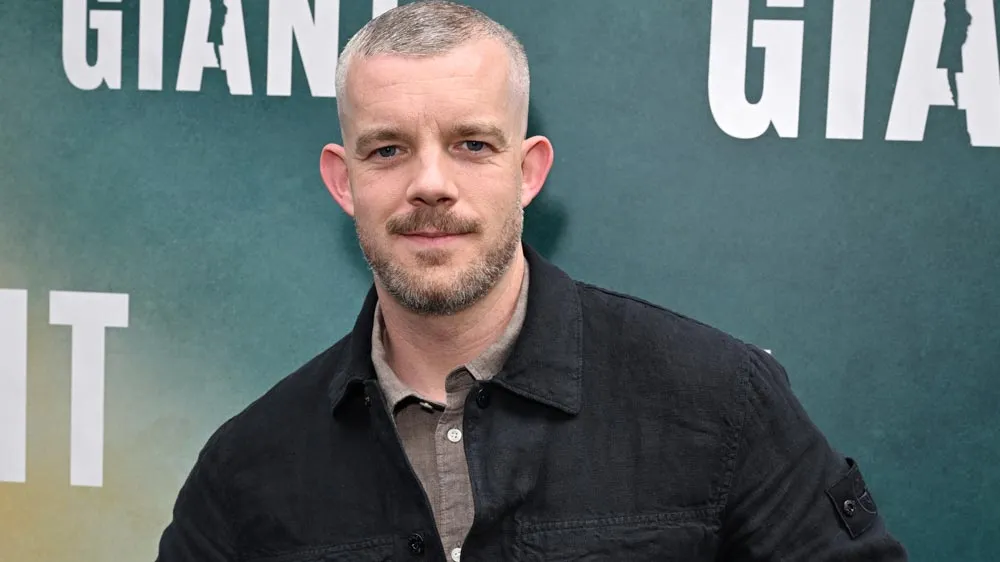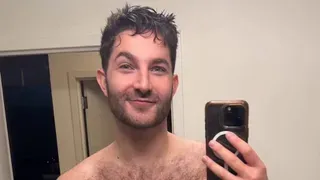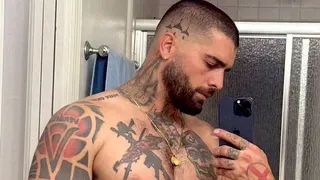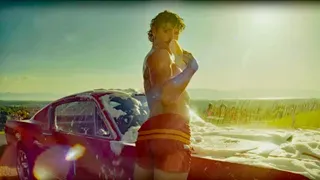September 20, 2013
Words for the Wise :: M. Bevin O'Gara, James Caverly, and Annie Wiegand on 'Tribes'
Kilian Melloy READ TIME: 18 MIN.
In Nina Raine's play "Tribes," a young deaf man named Billy ventures beyond the sphere of his loving, sometimes abrasive family, when he mets a young woman named Sylvia. Though not born deaf, Sylvia is losing her hearing and has learned to communicate in sign language -- something Billy's family has never encouraged Billy to do, pushing him instead to lip-read and learn to use verbal speech.
As his relationship with Sylvia grows, Billy discovers a wider world and with it Deaf, with a capital D, culture -- including, to his family's dismay, sign language.
With language and culture come group identity and its logical extension, identity politics. Billy's family fear that he's destined to become somehow radicalized. But for Billy, this is a crucial watershed; for years, he's been on the sidelines, only minimally participating in life. Now he has a chance to grow into himself.
EDGE had a chance recently to chat with some of the creative talent bringing "Tribes" to the stage as part of SpeakEasy Stage Company's new season. Among them was director M. Bevin O'Gara, who, at the tender age of 30, has already taken the Boston theater community by storm, directing SpeakEasy's critically acclaimed production of "Clybourne Park" last season and having helmed productions of "Love Person," "Bat Boy," "Matt and Ben," "2.5 Minute Ride," "Othello," and "The Crucible," among many others.
"Thank you," O'Gara replied when EDGE commented on her status as a theater wunderkind. "I don't really think of myself that way, but it's a nice thing to say. My father always said I was born 40, so at this point I'm closer to 70 then to 30.
"I've always done theater," O'Gara continued. "I wrote plays with my friends as a child and made my parents sit through them. At one point there was a rule: I could see my friends Valerie and Melissa, but there could be NO PLAY!
"The plays were pretty bad, but it got me started," the director added. "In high school, all of our school plays were directed by students. My drama teacher told me to apply for one of the three positions, but since the student directors were also chosen by the students and I was a geek among theatre geeks, I didn't get a slot. I was pretty disappointed, but had also been involved in the community theatre at the time. So I went to the head of the town Recreation Department (who ran the theatre program) and asked him if I could start to direct. And for some reason, he agreed. I directed about five shows for them during high school, and fell in love with directing. It felt like where I was meant to be, and that's what I've been doing ever since."
That career path led her to "Tribes" along a not-so-winding road.
"I had seen the play in New York very early in its run and fell in love with it," O'Gara recounted. "But I never thought that I would have the chance to direct it, so I was very surprised when Paul asked me about the project. I knew how strongly he felt about the script, and figured he would want to do it himself. But he knew about my background with the Deaf Community and experience working with deaf actors. Paul is a very smart producer, and I'm thrilled that he trusted me with incredible piece."
Raines is a British playwright, and her characters (and their dialogue) follow suit. That meant O'Gara was going to be casting for not just Deaf culture, but also British culture.
"I was looking for two things while casting this show," O'Gara told EDGE, "the ability for the actors to be warm, and to see if they could find the humor in the piece. On the page, the play can feel very cold and harsh; but really these characters love each other deeply and enjoy sparring with each other. It's how they show affection -- through argument. I needed to cast actors who could handle both of those things.
"The chemistry and the dynamic among the family members were also important, and I really lucked out on this one. For the last three weeks, I've been in a rehearsal room full of very fun people who enjoy what they do and really get along, so we're having a terrific time, and you can see it in the performances the actors are starting to shape."
The play is all about which culture one chooses to align with, or what group offers a communal sense of identity for individuals. O'Gara reflected on this.
"How does the group we belong to define us?" the director mused. "How does not being a part of one group change who we are? Is it better to have your own individual identity? Does membership in a group change your identity? I don't think that's anything uniquely British or American," O'Gara added. "I think it's just human.
"For the Deaf character Billy, you have to find someone who the audience will fall in love with and feel for before he even says a word," the director reflected. "When James Caverly walked in, I knew it had to be him. His energy is infectious."
EDGE had the chance to chat with Caverly, as well. The young actor is Deaf, but he worked to find more than that to explore and connect with in his character.
"I play Billy as someone we all can identify with -- someone who wants to be heard and understood," Caverly said. "The communication barrier is one thing I can comprehend but the underlying issue in this play is that he not be taken for granted. We all do feel that way sometimes, so I put myself into this humble but displaced family member trying to find his feet rather than just simply a Deaf man in need of a better method of communication. It's no surprise that when Billy meets Sylvia and is introduced to sign language, he views that as a breakthrough into discovering himself but hurts his family in the process."
It's a wonderful thing to see authentic casting and inclusive crew hiring in this production, but EDGE had to ask: Had the jobs all gone to hearing actors and tech people, would that have bothered Caverly on principle?
"If the role of Billy had gone to a hearing actor, it would definitely upset me," Caverly replied. "There are hundreds of talented Deaf actors out there -- casting a hearing actor for a Deaf role shows how unprofessionally and unethically the company conducts their casting process.
"But as for tech crew, it's a different matter," the actor continued. "I believe companies have the right to hire whomever they deem qualified and experienced for that role."
Case in point: The production's lighting designer, Annie Wiegand, who also chatted with EDGE about "Tribes." Her sentiments aligned with Caverly's. "Nina Raine's writing does specifically require a young Deaf man to be cast for the lead role," Wiegand pointed out. "I would have been very bothered if a hearing person had been cast in that particular role. You wouldn't cast a white person in a black person's role -- unless you wanted to set off equality alarms."
As for the inclusion of Deaf tech personnel, "the script doesn't specifically require a Deaf designer or technician on the creative team," Wiegand allowed. "However, having such a person on the creative team does allow for the production to design with further understanding and sensitivity of Deaf parameters -- culture, needs, etc."
As it turned out, O'Gara and Wiegand had worked together before, and Wiegand knew Caverly already.
"This is my third production with director Bevin O'Gara," Wiegand recounted. "Our two previous productions have both been with Company One -- 'Love Person' (Spring '12) and 'You For Me For You' (Winter '13). 'Love Person' actually had Deaf casting as well, so this will be our second show together with Deaf actors. We enjoy working together -- and it's been such a great experience working with Speakeasy."
It was through Wiegand that Caverly came to O'Gara's attention, the actor told EDGE: "When casting opened for 'Tribes,' Annie dropped my name to the company. They contacted me to come audition for them in Boston. I made the 3-hour trip from Connecticut to audition, and the rest is history."
O'Gara shared more about her previous experiences working with deaf characters and Deaf actors.
"For 'Clybourne,' because of the nature of the show (each act taking place 50 years apart, with each actor playing 2 different roles) I wasn't able to cast a Deaf actress to play the Deaf character, as she had to be hearing in Act 2," O'Gara recalled. "I was fortunate enough to bring on the glorious Sabrina Dennison (who was in my production of 'Love Person') to act as our ASL consultant on 'Clybourne.' Sabrina is also working with us on 'Tribes' now as our Director of Artistic Sign Language. She is with us nearly every night in rehearsal, coaching the actors on their signing and working with me to craft ASL translations of playwright Nina Raine's English script."
And that's not just for answering the script's demands for spoken English (or written; the play makes use of projected subtitles) to be turned into sign as Billy and Sylvia (Erica Spyres) communicate. The production's run includes two ASL-interpreted productions.
"Working with Deaf actors has changed they way that I work as a director," O'Gara told EDGE. "On 'Love Person,' I became very aware of the fact that everything I was saying needed to go through someone else (an interpreter) before it reached my actor. You have to be very clear about what you're asking, and you really need to think it through before you say it out loud. I now approach every direction I give this way. I try to be super clear, very concise, and know exactly what I'm asking.
"On 'Tribes,' what has been amazing is that we have only been using three interpreters for the entire process, some of whom I worked with on 'Love Person.' It's wonderful to have a short hand with them. They know me, I know them, and the communication is much easier. All of the Deaf artists I have worked with are beyond dedicated, beyond hard working. They really take everything that I say and build on it. I love working with them."
EDGE had a few questions for Wiegand and Caverly about Deaf culture and communication -- issues that might be quite obvious to anyone belonging to Deaf culture, but which could seem mysterious to members of the hearing world. For instance, when this correspondent has seen Deaf people conversing, they seem to carry on their chat even when not looking directly at one another.
"We are mind readers," Wiegand teased. "No, just kidding. I think a lot of it has to do with intuition. I find that a lot of Deaf people have a strong intuition when interacting with others. Survival of the fittest allowed us to adapt and one of those ways in adapting was to develop a strong intuition."
Caverly's explanation was a little simpler, if more mundane: He reckoned that Deaf people have cultivated their peripheral vision to a sufficient degree to make this possible. (Either that, or "they must have eyes at the back of their heads.")
Which led to another thought: The old myth has it that people living without input form sensory channel make up for it with enhanced sensitivity in other areas. (Remember that scene in "Ray" when Jamie Foxx, in the role of famed blind musician Ray Charles, can hear a hummingbird's wings outside a window?) How -- if at all -- might being Deaf have enhanced Wiegand's visual abilities? Could any such additional focus on the visual have contributed to her career as a lighting designer?
"Absolutely," Wiegand declared. "Being a Deaf lighting designer has become my calling card in a way. My heightened dependency on my eyes does really allow me to focus so much more on the visual elements of almost anything I am looking at: Something on stage, a TV show, or even a shower curtain. It's also allowed me to provide a different standpoint when it comes to designing a show -- I'm able to further contribute to what may visually happen on stage."
Getting back to ASL... well, this might be a stupid question, but does signing the same gesture with one hand versus the other change the meaning of the word being expressed?
"Sign language is ambidextrous," Caverly explained. "There's no limitations into which hand you use. I, myself, am dominantly right handed but if needs be, I could sign with my left -- the context will still be the same, nothing's changed."
Wiegand agreed, though with a caveat, noting that "it can be distracting to the eye if you don't stay with one hand."
Such questions certainly reveal the depth of unfamiliarity the average hearing individual has with regards to the Deaf experience, but writing for a GLBT publication has the benefit of reminding one -- as does the experience of simply being a sexual minority -- of the need to consciously lift one's head out of one's own demographic for a careful look around.
Indeed, Wiegand, who is a lesbian, offered some perspective on the dual status of being a sexual minority as well as part of the Deaf population.
"Deaf people are definitely a minority. The LGBT community probably has higher numbers if one was to compare," she pointed out. "I also find it interesting that within the Deaf community, there is a high number of GLBT members, myself being one of them. I often wonder if we GLBT Deaf people would then be considered a minority as well."
But in one way or another, who doesn't belong to a minority? Some, of course, are targeted for more attention, suspicion, and / or celebration than others. In "Tribes," Billy's family have all sorts of odd, even prejudicial, notions about Deaf culture, among them an inability to grasp that sign language really is a language of its own and not simply a form of mime to which Deaf people resort out of necessity.
Raines' script spends a little time exploring that, and Raines herself once wrote that she wondered about Deaf people whose use of sign is elevated in eloquence so that they, like hearing speakers whose verbal eloquence is celebrated, they become famed for their speaking ability among the Deaf.
"Wouldn't it be great to be a 'virtuoso' in sign?" Raine wrote. "They must exist, like poets or politicians in the hearing world..."
"You would be amazed at the sheer amount of talented ASL users out there," Caverly said. "There are researchers who devote their working lives mastering and exploring sign language; poets and storytellers using sign language to share their works; musicians expressing their songs in sign; and regular folks at home just sharing a bedtime story passed down from generations of Deaf descendants. I don't think you can really narrow it down to one category of a 'virtuoso' of sign, but rather, a compilation of sign language prodigies. The work they share makes them gifted in their own ways."
"Yes, there are most certainly some well-known performers that are such virtuosos in the Deaf community," Wiegand stated. "They are revered for their abilities to tell stories in ASL, mime, and gestures. They will tour the country performing for the Deaf communities that are spread throughout. Some of many names: Peter Cook, Rosa Lee Timm, and Manny Hernandez."
So how about when hearing people learn to speak using sign? Do they ever attain such eloquence? For that matter, do they ever become truly fluent? I once had a Deaf colleague who taught me some sign, and I felt that the vocabulary I picked up carried a terrible "accent" that was not quite clumsiness, but certainly lacked the fluid assurance of her sign.
"A few CODAs (Child Of Deaf Adult(s)) have fooled me in thinking that they were Deaf -- but actually, they were hearing," Wiegand disclosed. "So, yes there are some hearing people that can be absolutely fluent and nobody would be able to tell. Although, the majority of hearing people who sign do have some sort of accent that can be picked up by the eye.
"The same goes for Deaf people -- the kind of background a Deaf person had growing up can be told through their signing styles. Maybe they went to a residential state school for the Deaf, or they were mainstreamed with other hearing kids, or they didn't sign as a child. The variables are just as expanse as it is for spoken languages."
EDGE asked Wiegand whether she found working with Deaf actors was easier than working with hearing ones.
"Actors are actors -- Deaf or not," Wiegand responded. "I just want them to stay in their position so that I can light them properly. And they also always need to find their light."
This was good for a hearty chuckle, but one more questions persisted. Caverly had explained his attraction to "Tribes" by saying that this was not a "pity play" that treated the subject of deafness (or being part of Deaf culture) as something that merited a sense of unusual compassion. Asked whether Deaf people encounter pity routinely, Caverly indicated that yes, hearing people do seem to feel sorry for the Deaf.
"Pity is a common theme for the Deaf in media (television, newspaper, or movies), and it irks me," he explained. "Generally, hearing people view Deafness as an obstacle or hindrance that they have to overcome or get 'fixed.' For those of us in Deaf culture, including me, Deafness is a part of our identity, not a baggage in our life."
If anything, however, it's the so-called "normal" people with little chance to experience the world in different, and equally rich, ways for whom one might feel a little sorry. Asked whether he'd encountered attitudes in real life that are similar to the ones in his fictional stage family, Caverly replied, "I've been exposed to simple ignorance rather than steadfast oppositions. A lot of people have little or no knowledge of Deaf culture and sign language so naturally their curiosity consists of a lot of naive questions such as, 'Can you drive?' 'So you can read Braille?' 'How do you make love in the dark?' Those sort of things.
"I don't blame them for their innocuous questions; if it's sincere and inoffensive then I have no problem with answering them."
Whatever allowances Caverly has had to make for the wider world, within his stage family on this production he's found something of a safe haven and second home.
"I love my castmates and crew," Caverly enthused. "They're the best! At first when I signed up for the role, I wasn't sure how well I would connect with the cast but thankfully, SpeakEasy provided interpreters and I was able to communicate freely with them and they learned a bit of sign language in the process! We went through a lot of hours together both onstage and offstage (a lot of coffee was drunk as well)... I have no doubt in my heart that when the last line is spoken and the final bow is taken, I will miss them terribly."
"Tribes" runs through Oct. 12, 2013 at the Roberts Studio Theatre, Calderwood Pavilion, Boston Center for the Arts, 539 Tremont Street, Boston, MA. There are two ASL-interpreted performances scheduled: Sunday, October 6 at 7PM and Friday, October 11 at 8PM. For more information, visit the SpeakEasy website.
Kilian Melloy serves as EDGE Media Network's Associate Arts Editor and Staff Contributor. His professional memberships include the National Lesbian & Gay Journalists Association, the Boston Online Film Critics Association, The Gay and Lesbian Entertainment Critics Association, and the Boston Theater Critics Association's Elliot Norton Awards Committee.





